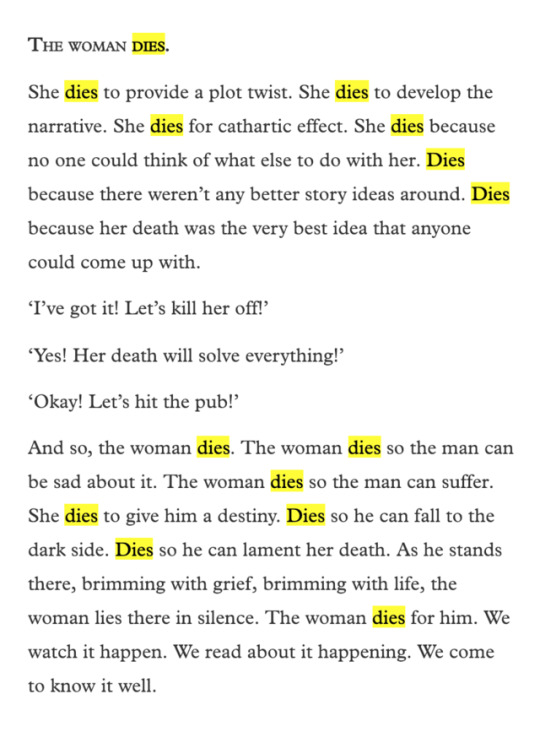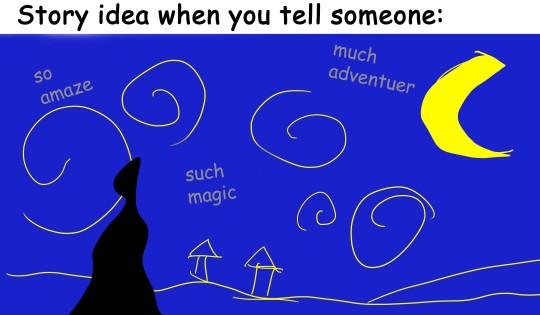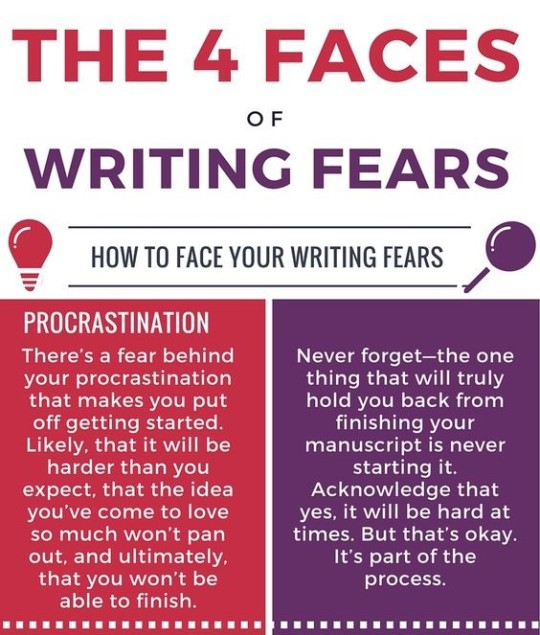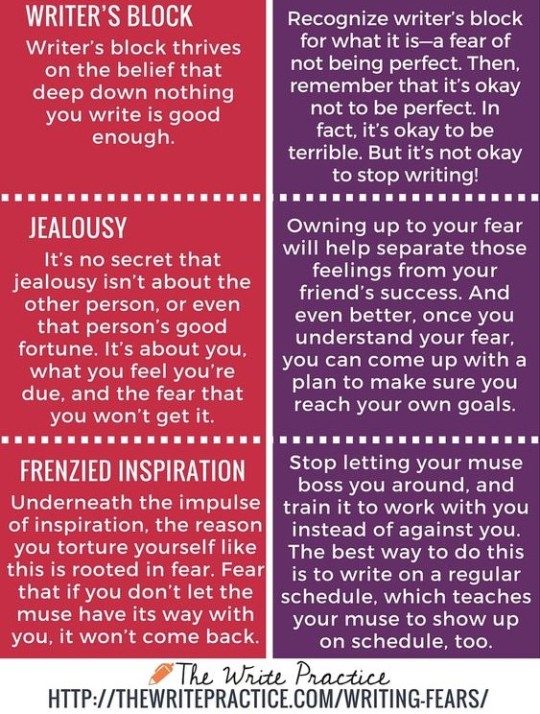reagan, xix, aspiring author, current wips: Vigilante, Genesis
Don't wanna be here? Send us removal request.
Text
On Breaking “The Rules”
It’s never that it’s impossible to write the way The Experts tell you not to and have it turn out well. It’s that people see dozens upon dozens of writers using the same format over and over, and there’s something about it that grates. So if you want to go against advice, step one is to recognize why the advice popped up in the first place. Let me explain with some examples:
1. Epithets. Readers are divided on this, and it typically comes down to exposure. Readers who usually limit themselves to reading bestsellers will be more forgiving of epithets than readers who, say, read a lot of fanfic. The problem is that a large chunk of the avid fanfic reading population has experienced a fic that both overused epithets and had innumerable other issues. Overusing epithets is thus associated with poor quality writing and a bad overall experience. If you are conscious of how epithets have been used poorly in the unpleasant fics, you will be able to not do that in your own writing.
2. Prologues. Drawing on my old-timey romance writer mom’s experience, the prologue issue is a matter of popular industry standards going awry. Basically, readers suffered through a good decade or two of spit boring, overly ominous, basically irrelevant prologues. So readers started skipping them. This creates the problem of there being a chunk of wasted words, because you can’t make it really tie in if nobody’s going to read it. But then, why waste the space? So now prologues have to strike that balance of being good and relevant but not totally pivotal to the plot, just in case the reader decides to just. Skip over it. But that’s not exactly impossible.
3. All unnecessary words should be removed. This appears to be a piece of trial-and-error advice. Meaning, it worked very well when some writers tried it, and this was common enough for it to gain a foothold in the community. But perhaps instead of calling it a “rule,” it really is just… something to try out. The thing to do is try it out in a controlled manner and accept or discard it according to your own tastes.
See, sometimes the rules popped up because some old fart of a writer got it up their ass that it should be Law. (just because stephen king gives some good advice sometimes doesn’t mean we need to worship him here) But sometimes the rules appeared because the readers themselves were having a bad experience with it. It’s worth figuring out what kind of impact breaking the rule is really going to have before you throw all caution to the wind.
Still, of course, there is no such thing as rules in art. The limits are what your word software is capable of handling.
12 notes
·
View notes
Text
i’ve been doing my homework on how to break into a writing career and honestly. there’s a Lot that i didn’t know about thats critical to a writing career in this day and age, and on the one hand, its understandable because we’re experiencing a massive cultural shift, but on the other hand, writers who do not have formal training in school or don’t have the connections to learn more via social osmosis end up extremely out of loop and working at a disadvantage.
162K notes
·
View notes
Text
Brownies
“Guess who!” Hands on her eyes, slightly sticky with summer sweat.
Sappho tried to roll her eyes, but her lashes caught on the palms over them.
“Who might that be. I definitely have no idea who it could be.”
“You gotta guess!”
“Hm, let me think…” She cupped her chin in her fingers, and the hands moved with her.
Part 3/? in Poetry Unspoken
Part 1 Neon // Part 2 Muse
Keep reading
6 notes
·
View notes
Photo

The Woman Dies | Aoko Matsuda | Granta Magazine
120K notes
·
View notes
Text
Why is Microsoft literally illiterate
100K notes
·
View notes
Text
Muse
How many times had Sappho not seen those eyes in her mind, dreaming of them even while she lay there, wide awake? Those blue eyes that were not blue like a summer sky, nor blue like an ocean at rest— they were blue like the last thing one saw while drowning.
She’d know. She’d been drowning for years.
“Sappho? Are you there?”
Sappho started. She shook her head and smiled. “Yes. Yes, sorry, just got lost for a moment back there.”
Erinna laughed the way she always did. Her smile big, so big her eyes closed into slits. Only a slim line of blue was visible.
Part 2/? in Poetry Unspoken
Part 1 Neon here.
Keep reading
#this is absolutely stunning#you hecking go abita#ur the best at that lesbian romance#girl gettin dat good shit done#you are an amazing writer omg
12 notes
·
View notes
Text
Embrace the Rewrite
Ok. You wrote a first draft. It’s exciting, it’s monumental, it’s amazing, and you do the thing everyone tells you to do and you leave it alone for a few weeks or months and then you come back to it and realizes it has Some Problems.
You may have heard by now, but this is normal. Remind yourself this is normal. No matter how many first drafts you’ve written, no matter how many times you’ve heard this advice, REMIND YOURSELF THIS IS NORMAL.
Now, after a few good deep breathes, you can begin the work. Sure, you can dive into that doc and start ripping apart sentences like a mechanic in an animated film, but that has never worked for me. The words are too messy, I can’t see what I’ve changed, and I soon get so lost in what’s good/bad/fine that I’m overthinking each word which is NOT what you want to do.
So instead, I open a nice clean new word doc, and I write another first draft. My second first draft. So it’s a second draft.
Ok, yes. I rewrite the entire thing.
BEFORE YOU PANIC, let’s rewind. There’s something else you do between the first and the second drafts, and that’s making some touch decisions.
Second drafts are GREAT for things like solidifying plot and pacing, strengthening characters and their arcs, making sure all the major pieces are there and ready to play. Second drafts are not great for grammar editing, fine tuning dialogue, or making that description of the main character’s bedroom really sing.
At the second draft, we’re still in big picture story mode, and that’s why this method works well for it.
So make your big plot decisions, decide which characters need more personality and which can be cut entirely, decide if you want that trope there, or this theme there, and sort out all your plot points into their strongest order.
And then rewrite the first draft. A better, more solid first draft. Probably a better written first draft, cause practice. In other words, a second draft.
If something about the ‘lost in the editing’ problem from earlier spoke to you, I recommend trying this method out. Other people have done this to great success, and its really the only way that works for me. Let me know if you try this, and what you think the pros/cons are for you.
Good luck, and happy writing.
98 notes
·
View notes
Text
Body language is completely unique to every single individual person and the science of body language is almost if not completely unreliable and if I have to listen to one more person claim they can “read” me by my body language I’m gonna flip.
MULTIPLE people in my life have told me they can “tell” I’m “self conscious” because I look at my feet when I walk and they say it like they want me to open up about some social insecurities, like I have some wall they’re about to break down and we’ll have a moment
And I tell them the same truth every single time:
As a kid we had two MASSIVE Holly trees in the backyard and my dad and my uncle, both well meaning but perhaps poor planners, said “yes a great place for a swing set is directly beneath those.”
So they built it there and the issue is that entire section of yard was a Minefield of dried Holly leaves with one final mission before they became dirt which was to Stab themselves into a child’s foot
And being that my siblings and I had some feral rage aversion to wearing shoes, we took to running to the swings on our tiptoes, staring at the ground for the leaves
And to this DAY I still look at the ground when I walk out of habit formed by a decade of that
And NO body language guide and NO BBC Sherlock wannabe would EVER source that
133K notes
·
View notes
Note
Hey I was wondering how to approach this situation. My character was in a trauma a few months before the real story begins, and I’m struggling with how to introduce that. I was thinking I could either just introduce the traumatic scene as a sort of prologue, but I know most skip them, but the information is still important. Or I could do a Dream beginning, but that’s pretty cliche. I could also introduce it later as if the character is in a similar situation and has a flashback of that. Help?
Revealing a character’s trauma.
These are all options, certainly, but you’re missing the most important aspect of any trauma: the effect it has on them now.
Trauma is more than just one painful moment and occasional flashbacks. It changes the way a person acts, the way they think and engage with the world. Show that aspect from the get go. Include all the little motions and thoughts that occur because the character experienced their trauma.
Maybe they avoid being touched by strangers, or they don’t like dark rooms, or they tell people to turn down the television in the other room because the louder noises make them jump. Maybe they refuse to go on dates alone, or pull away from their friend’s conversations when a certain topic comes up, or choose a new style of clothing. Maybe they walk the long way home, or have certain worlds blacklisted on all their social media, or cry for unusual reasons.
If you introduce your character with these obvious effects, it’ll make the audience wonder where they came from, and give you a chance to finally introduce the cause of them later on in the story without it feeling cliche or forced.
For more tips about revealing backstory components, check out this article!
441 notes
·
View notes
Text
Just because a writing session is short doesn’t mean it’s not good and productive.
Only got to write a 100 words? You’re a 100 words closer to finishing that story. Only managed one sentence? What is a novel but a big collection of sentences?
Each bit of progress is still progress, no matter how small. Cherish the spare moments you have to jot down your ideas, and don’t be afraid to take advantage of them whenever you can.
83 notes
·
View notes
Text
Neon
The music bled in her, and the people dancing around her blurred to streaks of light. It was as though she were falling through space at light speed— muddily, she thought, how could one fall through space, if there was no up or down out there?
Only a single face did not blur like the rest of the faces turning into falling stars. Lips red, blue eyes lined in black kohl that smudged at the edges, sweat as highlighter on her cheekbones, every detail on her face so clear it almost hurt. It was looking at something bright through a magnifying glass, and Sappho would not— could not stop looking.
She had seen that face, a long time ago. Had seen it crinkle with laughter and collapse in tears, had seen and known and loved it, before.
She was spun around suddenly— she stumbled, weak with alcohol and weed, and caught herself on the back of a sweaty someone she did not know— the music changed— her heart beat along the bass notes— and the lights lit up, green and scarlet and yellow, but all Sappho saw was the neon blue of eyes she had so loved, before.
Part 1/? in Poetry Unspoken
#my bbys writing#im so proud of you dahling#this is absolutely stunning#i love you sm abita holy shit this is great#keep up the fantastic work beautiful
4 notes
·
View notes
Text
If your character has a trait you consider one of their key features and it is never challenged in anyway, that trait will probably have about as much impact as their “tiny mole on their left buttcheek” trait.
For that trait NOT to fall totally flat, one or more of these things need to happen:
The trait exacerbates a situation in a bad way. (An extremely honest and trusting character reveals an important secret to the Big Bad’s lackey)
The character is given a choice to either act according to their traits or to subvert them. Often the subversion has the better outcome. They either maintain their trait and take a risk, or character development ensues. (A greedy character must escape. Leaving behind their riches goes against their very being, but it would allow them to escape easier. If they try to take some of their treasure with them, they do so at massive risk.)
The character is put in an environment or must work with a person that opposes their trait. (An extremely tidy person must live in their slob cousin’s filthy apartment for a week. / The character has a debilitating fear of being alone and they are stranded on their own on an island.)
The character is put in a situation that requires them to suppress their trait (A hotheaded character needs to have polite discourse with someone they hate)
29K notes
·
View notes
Note
Hey! Do you have any tips for people who've reached a block in their writing? I've been trying to plan out a plot for my book, but I've reached a point where I can't think of anything else
What to Do If You Get Stuck While Outlining Your Plot
Hi! Thanks for writing. Getting blocked can happen at all stages: Before writing, during writing, during outlining, in the idea stage, etc. But since you specifically said you’re reaching a block in your plot planning, I’ll address that :)
#1 Make sure your character’s motivation & conflict are “big” enough
If your character doesn’t have a book-length problem, you can get stuck trying to fill in empty space in the plot. In order to find more events to flesh out your story, you may need to make adjustments. Is their desire strong enough to fuel a book? Is the conflict big enough? Is their problem difficult to solve? If not, how can you make their problem harder? Or take longer to resolve?
You might need a combination of a fiercer desire, a bigger problem, more problems, more obstacles, and/ or a more stubborn antagonist to reveal potential scenes and events. For help with your character’s motivation and conflict, check out the PDF “Creating Character Arcs” in my Free Resource Library.
#2 Plot your story backwards
This can help you make sure you have a strong enough ending and open up new possibilities you might not have noticed while plotting forward. I have a post about it here.
#3 Use the but/therefore method
The but/therefore method is a great way to fill holes. It tests the cause-effect connections between your plot and character and almost always reveals gaps that need to be addressed with new or stronger scenes. Use this template for each scene or chapter:
Main character wants ______, but _______, therefore ______.
What comes after “wants” is the motivation for that chapter or scene. After “but” goes the conflict or obstacle. After “therefore” is the result or action the character takes, which leads into the next goal, and so on, and so on.
Chapter-by-chapter it might look something like this:
Chapter 1: Julian wants to ask Matt to the dance, but he’s scared of being rejected, therefore he slips a cryptic note into Matt’s locker.
Chapter 2: Matt doesn’t see the note. Now Julian wants to get into his locker and retrieve it, but the principal sees him trying to jimmy open the lock, therefore Julian is given detention for a week.
You can also do this scene-by-scene. My suggestion would be to start with the chapter outline, see what it reveals, then move into the scenes if you still feel stuck.
#4 Ask questions
Classic un-sticking questions start with “what if” or “why”? Asking questions can unlock new story directions you might not have noticed were there before.
What if the main character’s ex-boyfriend came back to town? What if they didn’t achieve that small goal back in chapter 4? What if they were hiding something? etc.
Why are they avoiding their sister? Why is it so difficult for them to apologize? Why haven’t they quit their job if they hate it so much? etc.
#5 Consider creating a subplot (or two or three)
A book-length story usually needs a few side stories to flesh out the main one. Look for areas of your story that could be expanded, characters that might take the story down a related tangent, and conflicts that seem small but could be bigger with some digging.
#6 Take a break
Sometimes, you just need to give it a rest. Walk away from your outline for at least a week. When you come back, you may see things you didn’t see before and be able to breathe new life into it. In the meantime, let your mind wander. It’s amazing what creative solutions writers can come up with when they aren’t “trying.”
//////////////
The Literary Architect is a writing advice blog run by me, Bucket Siler. For more writing help, check out my Free Resource Library, peruse my post guide, or hire me to edit your novel or short story. xoxo
3K notes
·
View notes
Text
Write a story where the main characters fuck up. Like, they let someone die because they were scared, or they reject a possible romantic interest out of snobbery and/or belief that nobody would have interest in them. Let your characters burn bridges, and let their mistakes have consequences. Some things are unforgivable, and it’s okay to have your main characters do these things. Everybody’s done something they regret. It’s hard (for me, personally) to do this because I love my characters so much, and I want them to succeed all the time, but it’s not realistic, and more importantly, it doesn’t make for as interesting as a story.
11K notes
·
View notes
Text
a lot of writers I talk to struggle with ‘starting’ to write, struggle with the beginning, the first step, the crushing fear of failure and imperfection looming over them stopping the process itself, afraid of mistakes
so here is my advice if you have trouble starting: see any future “mistakes” you might make in the story not as demerits or personal failures but as branches
some branches you’ll need to cut off to keep the tree healthy, but that doesn’t mean they weren’t part of it or meaningless, they were growing with the tree all along, they just weren’t the right fit
our mistakes don’t say anything about us as authors or make the potential of the story any less strong, they are a natural parts of the process, normal, be kind to your tree in all parts and all portions of it
it can only grow if you put the seed in the ground, yes it might grow the wrong way, yes it might never get as big as it might like, but remember we grow trees and stories for love, it’s still yours, still going to potentially provide something for someone
and still worth planting no matter the result, so plant
finally, if you do make mistakes I promise people will see the beauty of the leaves before they notice a few stray pieces out of place
394 notes
·
View notes



